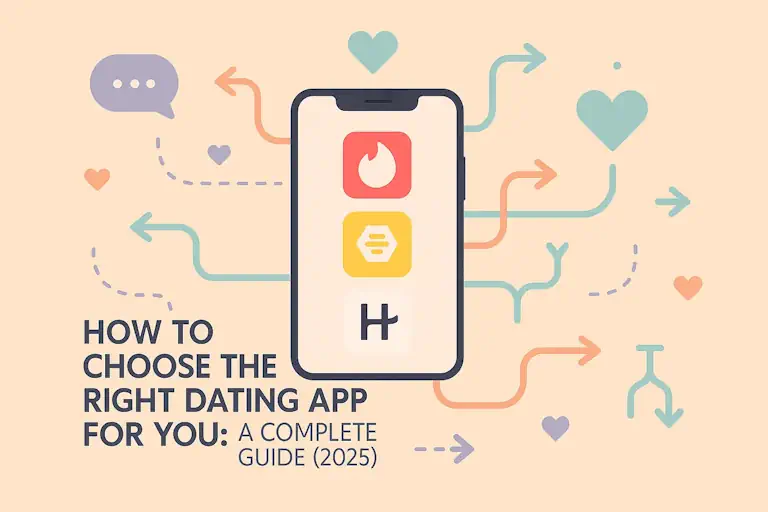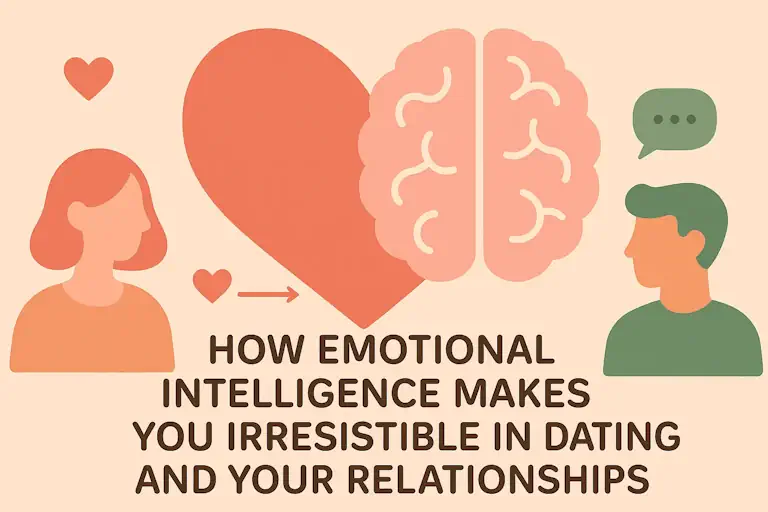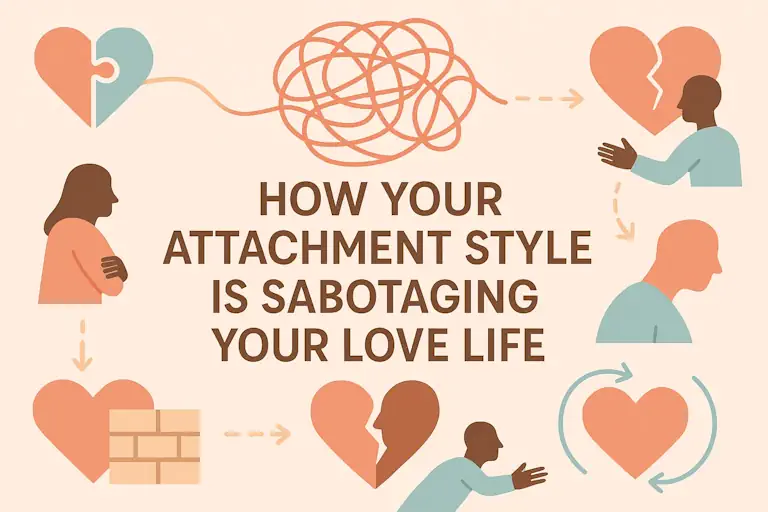Dating online can be a little like walking into a buffet while hungry, blindfolded, and slightly drunk. There's a lot of options, everything looks vaguely appealing (or terrifying), and you're not exactly sure what's going to give you food poisoning - or lead to love.
Over the years, I've tried more dating apps than I care to admit. Some led to relationships, a few led to unhinged voice memos, and most ended in silent uninstalls. So when people ask me, "Which dating app should I use?", I always answer with another question: What are you actually looking for?
Table of Contents
- First Things First: What Are You Actually Looking For?
- The Big 5 Dating Apps - Pros, Cons & Vibes
- Apps for Specific Needs (Niche, LGBTQ+, Over 40, etc.)
- Green Flags and Red Flags in Dating Apps
- How to Tell If an App Actually Matches Your Personality
- Common Mistakes People Make When Choosing an App
- Solving the Problem: How to Stop Swiping and Start Connecting
- Final Thoughts
First Things First: What Are You Actually Looking For?
Let's get brutally honest for a second.
Do you want something serious? Are you bored and lonely at 11pm on a Thursday? Are you trying to explore your sexuality? Or maybe you're secretly hoping to bump into your ex and look hotter than them?
Your intention should shape your app[1]. Otherwise, you'll be trying to find a relationship on Tinder and wondering why it feels like a frat party in hell.
A Quick Breakdown:
- Serious Relationship: Try Hinge, Bumble (for women who want more control), or even eHarmony if you're ready for long surveys.
- Casual Dating or Hookups: Tinder, Feeld (for open-minded folks), or Pure.
- Exploring Identity/Sexuality: Lex (queer text-based vibes), HER, or Grindr.
- Dating Over 40: SilverSingles, OurTime, or Match (yes, it still exists).
The Big 5 Dating Apps - Pros, Cons & Vibes
Here's what nobody tells you: each app has a distinct vibe, and it's not just about the features - it's about the people who use them.
| App | Pros | Cons |
|---|---|---|
|
Hinge
|
|
|
|
Tinder
|
|
|
|
Bumble
|
|
|
|
OkCupid
|
|
|
|
eHarmony
|
|
|
Apps for Specific Needs (Niche, LGBTQ+, Over 40, etc.)
Let's be real: the mainstream isn't for everyone.
If you're LGBTQ+, dating while neurodivergent, exploring polyamory, or just want someone who also loves vegan cooking and tarot cards - niche apps can be a blessing.
Some honorable mentions:
- Lex: Queer, text-based, chill vibes.
- Feeld: For ethically non-monogamous folks or anyone curious about kinks and open relationships.
- SilverSingles/OurTime: Actually usable for people over 50.
- Coffee Meets Bagel: For people who hate swiping but still want a shot at love.
Green Flags and Red Flags in Dating Apps
Apps themselves aren't toxic - but the design can encourage toxic behavior[2].
Red Flags:
- Gamified swiping with no profile substance.
- Overly pushy premium plans that hide basic features.
- Apps that never clean out fake/bot profiles.
Green Flags:
- Prompts that spark personality.
- Users encouraged to verify profiles.
- Options to filter for intentions and lifestyle.
How to Tell If an App Actually Matches Your Personality
Introverts often hate Tinder. Not because of the people - but because endless swiping drains their soul[3].
- If you're sarcastic and witty: OkCupid might be your zone.
- If you love thoughtful, slower-paced conversations: Hinge.
- If you're chaotic good and want to see what happens: Feeld or Tinder.
Quick Tip:
Think about how you talk to strangers, how often you check your phone, and how much emotional energy you want to give to dating. Then match that to the app.
Common Mistakes People Make When Choosing an App
- Choosing what friends use without considering your own needs.
- Assuming niche apps are lesser options.
- Not setting up your profile with your actual preferences (you can say you want a relationship and still get matches who don't).
- Jumping to three apps at once and burning out in a week.
Solving the Problem: How to Stop Swiping and Start Connecting
Here's the truth: No app will work if you're using it like a game instead of a tool.
Take one app. Commit to it for two weeks. Actually read bios. Send messages that aren't just "hey." Ask weird questions. Unmatch fast if something feels off. Slow down[4].
Dating apps are a tool - not a personality. The right one will help you get to the good part faster: the person, not the profile.
Check out our dating app quiz to find the right app for you.
Final Thoughts
Choosing the right dating app isn't about which one has the best UI or hottest users. It's about finding a space that matches your goals, your communication style, and yes – even your emotional bandwidth.
If you're overwhelmed, frustrated, or jaded – it's probably not just the app. Maybe you're in a phase where you need to date yourself first. And that's okay too.
But if you're ready, if your heart has that slightly anxious excitement that comes before something good – pick the app that feels right, open it with intention, and give it a real shot.
And when you do? Make sure your profile reflects the best, realest version of you. Here’s our guide on writing a bio that actually sparks connection – not just swipes.
Because love, connection, even a really great first date – all of that is still possible.
Reader Stories
"After trying multiple dating apps, Hinge was the game-changer for me. The prompts encouraged genuine conversations, and I connected with matches who were actually looking for relationships. Met my partner of 8 months there - worth every minute I spent creating a thoughtful profile!"
"I spent years endlessly swiping on Tinder with little success. After reading an article like this, I tried Bumble instead. The quality of conversations improved immediately, and I appreciated that women made the first move - it seemed to filter out people who weren't serious. Three months in and I'm dating someone incredible!"
Frequently Asked Questions: Dating Apps
Which dating app is best for serious relationships?
For serious relationships, apps like Hinge, eHarmony, and Bumble tend to attract more relationship-minded individuals. Hinge's "designed to be deleted" approach focuses on meaningful connections, while eHarmony's detailed matching system and longer sign-up process naturally filter out those looking for casual encounters. Bumble's women-message-first feature often leads to more intentional conversations and connections.
Are paid dating apps worth the investment?
The value of paid dating apps depends on your dating goals and budget. Premium features can be worth it if you're serious about finding a long-term partner and want access to advanced filters, unlimited likes, and seeing who liked you. However, many people find success with free versions. Start with the free version, and if you find yourself consistently bumping into limitations that affect your dating experience, then consider upgrading.
How many dating apps should I use at once?
It's generally recommended to start with just one or two apps. Using too many simultaneously can lead to dating app burnout and make it harder to give meaningful attention to your matches. Choose one main app that aligns with your goals and give it a fair try for at least two weeks. If you're not seeing results, you can try a different app rather than juggling multiple ones at once.
How can I stay safe while using dating apps?
Safety on dating apps is crucial. Always verify profiles through video calls before meeting in person, meet in public places for first dates, share your location with trusted friends, and trust your instincts if something feels off. Use apps that require profile verification and have reporting features. Never share personal financial information or send money to matches, and be cautious about sharing personal details until you've established trust. Remember that it's okay to take things slow and set boundaries.
References
- Goleman, D. (1995). Emotional Intelligence: Why It Can Matter More Than IQ. New York: Bantam Books.
- Mayer, J. D., & Salovey, P. (1997). What is emotional intelligence? In P. Salovey & D. Sluyter (Eds.), Emotional development and emotional intelligence: Educational implications (pp. 3-31). New York: Basic Books.
- Gottman, J., & Silver, N. (2015). The Seven Principles for Making Marriage Work. New York: Harmony Books.
- Brackett, M. A., Rivers, S. E., & Salovey, P. (2011). Emotional intelligence: Implications for personal, social, academic, and workplace success. Social and Personality Psychology Compass, 5(1), 88-103.
 The Modern Dater
The Modern Dater


.webp)

